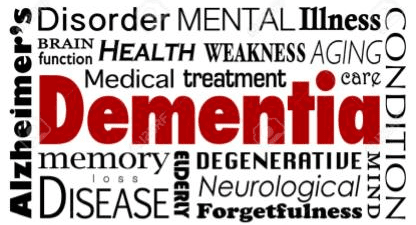By: Vicki Taylor
In Part 1 of the 2 part series I wondered whether there was a link between having a Mental Illness and developing Dementia. I was genuinely concerned, as I felt I was experiencing more than the normal “aging” memory issues. Other cognitive issues included inability to focus, think clearly, or make sound decisions.
I had talked to a Tampa, FL psychiatrist and asked him questions, which he answered in Part 1. Continuing to research possible links brought me closer to some answers, but nothing concrete. I’ll let you see for yourself.
First, let me refresh your memory, (and mine) about Dementia. According to the Alzheimer’s Association, “Dementia is not a specific disease. It’s an overall term that describes a wide range of symptoms associated with a decline in memory or other thinking skills severe enough to reduce a person’s ability to perform everyday activities.” You can visit their website for further information about early warning signs, symptoms, causes, diagnosis, and treatment.
As for the link between Dementia and Mental Illness, this statement helped me find hope: “If depression is indeed a risk factor for Dementia, treating Depression should help stave off dementia, but no studies have shown this effect”said lead author Jane Saczynski, Assistant Professor of Medicine at the University of Massachusetts Medical School.
Another study identified in the PsychNet Journal, tested twins for more than 10 years. They determined a “History of depression and other psychiatric illness as risk factors for Alzheimer disease in a twin sample.”* I must tell you, that every study I’ve read has found a link between Mental Illness and Dementia, but none of them have found the reason or cause.
In an article about Dementia, I discovered the following: Dementia can be caused by one medical condition or by multiple medical problems. Some types of Dementia can be cured partially or completely with treatment. The degree of reversibility often depends on how quickly the underlying cause is detected and treated. Other types of dementia are irreversible and cannot be cured (e.g., dementia due to Alzheimer’s Disease).
According to the Mayo Clinic, “Treatment of the underlying causes of dementia can also slow or sometimes stop its progress.” Particularly, the specific drug categories:
· Cholinesterase Inhibitors – These are Alzheimer’s drugs that work by boosting levels of a chemical messenger involved in memory and judgment. Side effects can include nausea, vomiting and diarrhea. Although primarily used as Alzheimer’s drugs, they’re also used to treat vascular, Parkinson’s and Lewy body dementias.
· Glutamate Regulators – This drug for Alzheimer’s disease works by regulating the activity of glutamate, another chemical messenger involved in all brain function, including learning and memory. Its most common side effect is dizziness. Some research has shown that combining a Glutamate Regulator with a Cholinesterase Inhibitor may have even better results.
Is Dementia a foregone conclusion for those of us with Mental Health issues?
Hardly.
In an article in AARP e-magazine, 6 Types of Normal Memory Lapses, the author says that many memory lapses and “brain freeze” are just a normal part of growing older and gives memory tips to help you with each kind of memory lapse. “Studies have shown that people who exercise, stay mentally active, socialize regularly and eat a healthy diet can minimize memory loss.” *
So, don’t freak out like I did and get all paranoid and full of fear about impending aging brain diseases. We all have enough to deal with as it is.
Don’t worry. Be Happy.
And, don’t forget to take care of yourself, both physically and mentally. It’s for your own good.
* Wetherell, Julie Loebach; Gatz, Margaret; Johansson, Boo; Pedersen, Nancy L. Alzheimer Disease and Associated Disorders, Vol 13(1), Mar 1999, 47-52.


